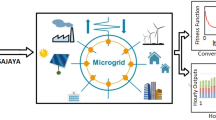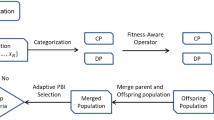Abstract
Generation expansion planning (GEP) is a widely studied problem in the literature. However, with increasing participation of renewable energy sources (RES), the problem has to be looked upon considering intermittency associated with these sources. Integration of storage devices is seen as a viable option for counteracting the intermittency, particularly in isolated micro-grid (IMG). This paper puts forth a generalized mathematical structure for GEP centred on techno-economic criteria which duly addresses uncertainties associated with RES and correspondingly proposes a plan for addition of RES and storage units. As GEP problem is a highly constrained, large-scale problem involving assessment of enormous combinations, a decentralized multi-agent system (MAS) is used along with butterfly particle swarm optimization (BFPSO) technique for parallel processing. Hybridization of features of MAS with BFPSO called as multi-agent-based butterfly PSO algorithm (MABFPSO) presents a time effective and more accurate alternative to existing optimization techniques for addressing GEP problem. The formulation has been applied on IMG comprising of RES (solar and wind) and battery storage system. Results obtained from MABFPSO are compared with PSO with the purpose of establishing superiority of MABFPSO. It has been found that MABFPSO provides a cost benefit of 3.5% in comparison with classic PSO. For the same reliability standards, the capacity addition required for solar and wind generators is similar for both the techniques. However, the storage capacity requirement with PSO is 100% higher in comparison with that of MABFPSO. The comparison of convergence characteristics of two techniques clearly demonstrates that on the iteration scale, MABFPSO presents 29.6% faster convergence in comparison with that of PSO.














Similar content being viewed by others
Data availability
Data available on request from the authors.
Change history
06 July 2022
A Correction to this paper has been published: https://doi.org/10.1007/s11227-022-04683-1
References
Meza JLC, Yildirim MB, Masud ASM (2009) A multiobjective evolutionary programming algorithm and its applications to power generation expansion planning. IEEE Trans Syst Man Cybern A Syst Humans 39(5):1086–1096. https://doi.org/10.1109/TSMCA.2009.2025868
Barteczko-Hibbert C, Bonis I, Binns M, Theodoropoulos C, Azapagic A (2014) A multi-period mixed-integer linear optimisation of future electricity supply considering life cycle costs and environmental impacts. Appl Energy 133:317–334. https://doi.org/10.1016/j.apenergy.2014.07.066
Hamidpour H, Aghaei J, Pirouzi S, Dehghan S, Niknam T (2019) Flexible, reliable, and renewable power system resource expansion planning considering energy storage systems and demand response programs. IET Renew Power Gener 13(11):1862–1872. https://doi.org/10.1049/iet-rpg.2019.0020
Hemmati S, Ghaderi SF, Ghaderi MS (2018) Sustainable energy hub design under uncertainty using Benders decomposition method. Energy 143:1029–1047. https://doi.org/10.1016/j.energy.2017.11.052
Javadi MS, Saniei M, Mashhadi HR, Gutiérrez-Alcaraz G (2013) Multi-objective expansion planning approach: distant wind farms and limited energy resources integration. IET Renew Power Gener 7:652–668. https://doi.org/10.1049/iet-rpg.2012.0218
Park YM, Won JR, Park JB, Kim DG (1999) Generation expansion planning based on an advanced evolutionary programming. IEEE Trans Power Syst 14(1):299–305. https://doi.org/10.1109/59.744547
Neshat N, Amin-Naseri M (2015) Cleaner power generation through market-driven generation expansion planning: an agent-based hybrid framework of game theory and particle swarm optimization. J Clean Prod 105:206–217. https://doi.org/10.1016/j.jclepro.2014.10.083
Park JB, Park YM, Won JR, Lee KY (2000) An improved genetic algorithm for generation expansion planning. IEEE Trans Power Syst 15(3):916–922. https://doi.org/10.1109/59.871713
Firmo HT, Legey LFL (2002) Generation expansion planning: an iterative genetic algorithm approach. IEEE Trans Power Syst 17(3):901–906. https://doi.org/10.1109/TPWRS.2002.801036
Jadidoleslam M, Ebrahimi A (2015) Reliability constrained generation expansion planning by a modified shuffled frog leaping algorithm. Int J Electr Power Energy Syst 64:743–751. https://doi.org/10.1016/j.ijepes.2014.07.073
Ardakani F, Ardehali M (2017) Optimization of mixed-integer non-linear electricity generation expansion planning problem based on newly improved gravitational search algorithm. AUT J Electr Eng 49(2):161–172. https://doi.org/10.22060/eej.2017.12123.5041
Rajesh K, Kannan S, Thangaraj C (2016) Least cost generation expansion planning with wind power plant incorporating emission using differential evolution algorithm. Int J Electr Power Energy Syst 80:275–286. https://doi.org/10.1016/j.ijepes.2016.01.047
Cong H, Wang X, Jiang C (2019) Two-stage nested bilevel model for generation expansion planning in combined electricity and gas markets. IET Gener Transm Distrib 13(15):3443–3454. https://doi.org/10.1049/iet-gtd.2019.0293
Asensio M, Munoz-Delgado G, Contreras J (2017) A Bi-level approach to distribution network and renewable energy expansion planning considering demand response. IEEE Trans Power Syst. https://doi.org/10.1109/TPWRS.2017.2672798
Bachner G, Steininger KW, Williges K, Tuerk A (2019) The economy-wide effects of large-scale renewable electricity expansion in Europe: the role of integration costs. Renew Energy 134:1369–1380. https://doi.org/10.1016/j.renene.2018.09.052
Ashraf MM, Malik TN (2019) Least cost generation expansion planning in the presence of renewable energy sources using correction matrix method with indicators-based discrete water cycle algorithm. J Renew Sustain Energy 11(5):056301. https://doi.org/10.1063/1.5094540
Lv T, Yang Qi, Deng Xu, Xu J, Gao J (2020) Generation expansion planning considering the output and flexibility requirement of renewable energy: the case of Jiangsu Province. Front Energy Res 8:39. https://doi.org/10.3389/fenrg.2020.00039
Abbas F, Habib S, Feng D, Yan Z (2018) Optimizing generation capacities incorporating renewable energy with storage systems using genetic algorithms. Electronics 7:100. https://doi.org/10.3390/electronics7070100
Canizes B, Soares J, Lezama F, Silva C, Vale Z, Corchado JM (2019) Optimal expansion planning considering storage investment and seasonal effect of demand and renewable generation. Renew Energy 138:937–954. https://doi.org/10.1016/j.renene.2019.02.006
Asensio M, Meneses de Quevedo P, Muñoz-Delgado G, Contreras J (2018) Joint distribution network and renewable energy expansion planning considering demand response and energy storage—part i: stochastic programming model. IEEE Trans Smart Grid 9(2):655–666. https://doi.org/10.1109/TSG.2016.2560339
da Costa LC, Thomé FS, Garcia JD, Pereira MVF (2021) Reliability-constrained power system expansion planning: a stochastic risk-averse optimization approach. IEEE Trans Power Syst 36(1):97–106. https://doi.org/10.1109/TPWRS.2020.3007974
Paliwal P, Patidar NP, Nema RK (2014) Determination of reliability constrained optimal resource mix for an autonomous hybrid power system using particle swarm optimization. Renew Energy 63:194–204. https://doi.org/10.1016/j.renene.2013.09.003
Paliwal P, Patidar NP, Nema RK (2014) A novel method for reliability assessment of autonomous PV-wind-storage system using probabilistic storage model. Int J Electr Power Energy Syst 55:692–703. https://doi.org/10.1016/j.ijepes.2013.10.010
Paliwal P (2021) Comprehensive analysis of DER penetration and placement using probabilistic framework. IET Renew Power Gener 15(4):794–808. https://doi.org/10.1049/rpg2.12069
Paliwal P, Patidar NP, Nema RK (2020) Probabilistic indices for analyzing the impact of DER penetration on system reliability. IET Renew Power Gener 14(12):2154–2165. https://doi.org/10.1049/iet-rpg.2019.1214
Wankhede SK, Paliwal P, Kirar MK (2020) Increasing penetration of DERs in smart grid framework: a state-of-the-art review on challenges, mitigation techniques and role of smart inverters. J Circuits Syst Comput 29(16):2030014. https://doi.org/10.1142/S0218126620300147
Khatod DK, Pant V, Sharma JD (2010) Analytical approach for well-being assessment of small isolated power systems with solar and wind energy sources. IEEE Trans Energy Convers 25(2):535–545. https://doi.org/10.1109/TEC.2009.2033881
Kamdar R, Paliwal P, Kumar Y (2019) A hybrid multi-agent based BFPSO algorithm for optimization of benchmark functions. J Circuits Syst Comput. https://doi.org/10.1142/S0218126620501121
Tong L, Dong M, Ai B, Jing C (2018) A simple butterfly particle swarm optimization algorithm with the fitness-based adaptive inertia weight and the opposition-based learning average elite strategy. Fundam Inform 163(2):205–223. https://doi.org/10.3233/FI-2018-1738
Grigg C et al (1999) The IEEE reliability test system-1996. A report prepared by the reliability test system task force of the application of probability methods subcommittee. IEEE Trans Power Syst 14(3):1010–1020. https://doi.org/10.1109/59.780914
Mani A (1992) Wind energy resource survey in India-II. Allied Publishers Limited, London
Zones SI, Jayanthi K, Pascual J, Xie D, Navrotsky A (2021) Energetics of the local environment of structure-directing agents influence zeolite synthesis. Chem Mater 33(6):2126–2138
Paliwal P (2020) Reliability constrained planning and sensitivity analysis for solar-wind-battery based isolated power system. Int J Sustain Energy Plan Manag 29:109–126. https://doi.org/10.5278/ijsepm.4599
Paliwal P (2021) Determining optimal component sizes for an isolated solar-battery micro-grid using Butterfly PSO. In: 1st International Conference on Power Electronics and Energy (ICPEE), pp 1–6. https://doi.org/10.1109/ICPEE50452.2021.9358614
https://www.nrel.gov/. Accessed on 17 Aug, 2021
http://www.inwea.org/. Accessed on 17 Aug, 2021
India Meteorological Department (2009) Solar Radiant Energy over India. Ministry of Earth Sciences
Acknowledgements
No acknowledge.
Funding
No funding is involved in this work.
Author information
Authors and Affiliations
Contributions
There is no authorship contribution.
Corresponding author
Ethics declarations
Conflict of interest
Conflict of interest is not applicable in this work.
Ethics approval and consent to participate
No participation of humans takes place in this implementation process.
Human and animal rights
No violation of Human and Animal Rights is involved.
Additional information
Publisher's Note
Springer Nature remains neutral with regard to jurisdictional claims in published maps and institutional affiliations.
The original online version of this article was revised: In this article the affiliation details for Julian L. Webber were incorrectly assigned. Furthermore, the order that the authors appeared in the author list was incorrect.
Rights and permissions
About this article
Cite this article
Paliwal, P., Webber, J.L., Mehbodniya, A. et al. Multi-agent-based approach for generation expansion planning in isolated micro-grid with renewable energy sources and battery storage. J Supercomput 78, 18497–18523 (2022). https://doi.org/10.1007/s11227-022-04609-x
Accepted:
Published:
Issue Date:
DOI: https://doi.org/10.1007/s11227-022-04609-x




